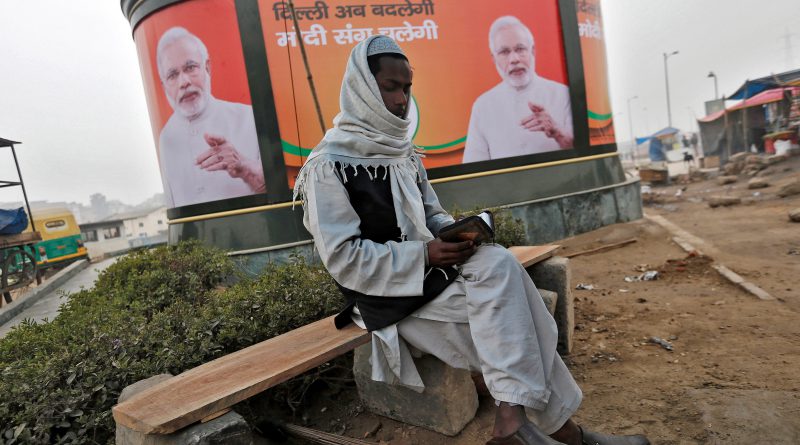India’s Modi sparks political storm with pitch for common civil code
New Delhi (Reuters) – Nine months before a general election, Indian Prime Minister Narendra Modi and his Hindu nationalist Bharatiya Janata Party (BJP) have dusted off a potentially divisive plan to enact a common set of personal laws for all, irrespective of religion.
Currently, India’s Hindus, Muslims, Christians and large tribal populations follow their own personal laws and customs, alongside an optional secular code, for marriage, divorce, adoption and inheritance.
The Law Commission, a government-appointed advisory body, has sought public opinion by Friday on creating a Uniform Civil Code (UCC). It had received more than 5 million responses online on the eve of the deadline.
The BJP says the common code is necessary to ensure gender justice, equality through uniform application of personal laws, and to foster national unity and integration.
“If there is one law for one family member and another for another family member, can that family function smoothly? How can a country function with such dual systems?” Modi said at a BJP meeting late last month, just days after he returned from state visits to the U.S. and Egypt.
The comments were his most forceful in favour of the common code and set off a political storm.
Critics call the push for a common civil code a cynical attempt to divide communities and consolidate Hindu votes for the BJP ahead of the 2024 general election. Supporters, who include some Muslim women’s rights groups, say it is much needed reform to end discriminatory Islamist practices.
“The idea is to send a message to the majority community so that you are able to keep the majority community polarised in favour of BJP,” said Sanjay Kumar, political analyst and psephologist at New Delhi’s Centre for the Study of Developing Societies.
“This is a kind of a tool to divide and mobilise,” he said.
India’s Muslims, the country’s largest minority with about 200 million of the 1.4 billion population, are mostly sharply opposed to the plan.
Although no draft of the UCC has been presented, BJP leaders have said it primarily has to do with reforming Muslim personal laws as other personal laws have progressed over the decades.
Many Muslims say they see it as interference with centuries-old Islamic practices and another weapon for a majoritarian political party that they accuse of being anti-Muslim.
No Valid Ground
The All India Muslim Personal Law Board, a voluntary body that represents the interests of Indian Muslims on personal law issues, has sent its objections to the Law Commission saying “mere projection of uniformity is not a valid ground for uprooting established systems of laws governing personal matters”.
“Majoritarian morality must not supersede personal laws, religious freedom, and minority rights in the name of a code which remains an enigma,” it said.
India’s next general election has to be held by May 2024 and follows commanding wins for BJP in 2014 and 2019. Critics say the party’s campaign playbook has been to polarise voters along religious lines and take advantage of the heavy Hindu majority, although the BJP maintains it represents all Indians and that it wants growth for all.
Modi and the BJP are widely expected to win a third term, but the ruling party got a scare when it lost elections to the main opposition Congress party in Karnataka state in May. Opposition groups are now working to pose a united challenge in 2024.
Some analysts say the UCC plan will force opposition parties into a corner. They cannot support it, and if they oppose it, they will be accused of being reactionary and pandering to conservative Muslims.
The Congress, for instance, has only said it questions the timing of the plan and has asked to see a draft.
Sushil Modi, a senior BJP leader and member of parliament, said the UCC plan was not related to the election.
“In India you have elections all the time,” said Modi, who is not related to the prime minister. “Someone has to show the courage, someone has to take the initiative. We are showing the courage and doing it.”
Key Muslim personal law issues that are expected to be addressed are the age of marriage, polygamy and inheritance, said another BJP leader and a judiciary source, who both declined to be identified.
Muslim personal laws in India for instance, allow Muslim males and females to marry after attaining puberty while all other Indian males have to be 21 years old and females 18 years old to get married.
Muslim men are allowed to have up to four wives at the same time and Muslim men get double the share of female siblings during inheritance.
Keep Alive
To start with, the government could raise the age of marriage for Muslims to match others, outlaw polygamy and mandate an equal share of inheritance for Muslim men and women, the BJP source said.
Just a handful of these changes may not qualify to be called UCC in the true sense, yet it would be major reform and a political achievement, the source said.
Legal experts and political analysts say even this would need extensive consultations and political consensus to get past parliament and there isn’t enough time before the elections.
BJP’s aim, therefore, appears to be to keep the issue in the public eye and enact the code if it returns to power as expected, they said.
“It will be raised in the run-up to 2024, it will be used, harnessed,” said Zakia Soman, co-founder of the Indian Muslim Women’s Movement, which strongly supports the UCC despite its reservations about the politics linked to it.
“The fact that it is being championed by the BJP government doesn’t help because the onslaught (on Muslims) has been very consistent and that gives credence to the conservative bogey that this is an attack on Muslims, an attack on Islam,” she said.



